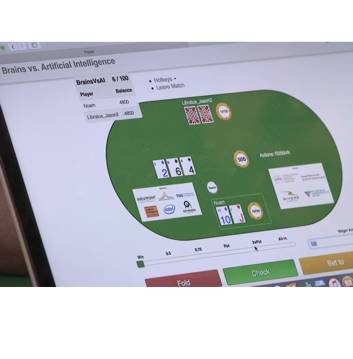| AI Beats Top Poker Players |
| Written by Sue Gee | |||
| Wednesday, 01 February 2017 | |||
|
After a marathon match of No Limit Texas Hold'em against four of the world's best professional poker players, Libratus an AI developed at Carnegie Mellon by a decisive $1.77 million in chips. At the time of our previous report of the contest that took place at Rivers Casino in Pittsburgh starting on January 11th, it looked likely that Libratus would emerge as the winner, despite a shaky start that gave hope to its opponents. However the degree to which its game play improved over the 20-day match was impressive and came as a surprise to the human players who had initially questioned its ability to bluff. In this Carnegie Mellon video, taken just over halfway though the event we hear the reactions of poker pros, Jason Les and Jimmy Chou, to the way in which the match was progressing and its creator, Professor Tuomas Sandholm, explains the abilities needed for poker are the same as those in other complex multi-agent situations, such as business negotiation:
Now the game has concluded with Libratutus leading the pros by a collective $1,766,250 in chips - although no-one gets those winnings. The four pro's will share $200,000 based on their performances while the Libratus team plans to publish its AI algorithms in a peer-reviewed journal. Having been reticent up to now about how Libratus operates for fear of giving any advantage to the human players, Sandholm has already shared some of its broad outline. Libratus has three main parts, the first of which isn't very different from that of Claudico, its predecessor which had an inconclusive win over human opponents in 2015. This part concentrates on strategies to use at the start of a game and, as previously reported, had been invested with 15 million core hours of computation on the Bridges computer at the Pittsburgh Supercomputing Center (PSC) prior to the match. The second part of the AI, the "endgame solver" had been completely redesigned by Sandholm and his PhD student Noam Brown for Libratus and whereas it wasn't possible to tell from statistical analysis whether in the earlier version it improved the way Claudico played at all, the updated version was described by Sandholm as "awesome". In the third part of Libratus, the AI looked for its own strategic weaknesses so it could change how it played before the next session and for this the Carnegie-Mellon team relied on being able to give it time on the National Science Foundation-funded Bridges computer overnight throughout the contest. It used of approximately 600 of Bridges’ 846 compute nodes. Bridges total speed is 1.35 petaflops, about 7,250 times as fast as a high-end laptop, and its memory is 274 terabytes, about 17,500 as much as you’d get in that laptop. Explaining this Sandholm said: “After play ended each day, a meta-algorithm analyzed what holes the pros had identified and exploited in Libratus’ strategy. It then prioritized the holes and algorithmically patched the top three using the supercomputer each night." In other words, Libratus it learned how to identify things its opponents were exploiting, such as a giveaway “tell” that another player had noticed. It was this that made it tougher to play each day, something that the human players noted.
“Libratus’ win is an important milestone toward developing AIs to address complex, real-world problems. At the same time, Bridges is powering new discoveries in the physical sciences, biology, social science, business and even the humanities.” With the Brains vs AI contest over, Sandholm intends to continue his research into the core technologies involved in solving imperfect-information games and in applying these technologies to real-world problems. More InformationBrains vs Artificial Intelligence Site Related ArticlesAI Prevails Against Human Poker Champions Why AlphaGo Changes Everything AlphaGo Revealed As Mystery Player On Winning Streak To be informed about new articles on I Programmer, sign up for our weekly newsletter, subscribe to the RSS feed and follow us on Twitter, Facebook or Linkedin.
Comments
or email your comment to: comments@i-programmer.info
|
|||
| Last Updated ( Wednesday, 01 February 2017 ) |

 Nick Nystrom, PSC’s senior director of research and principal investigator for the Bridges system commented on how Libratus success isn't confined to Poker:
Nick Nystrom, PSC’s senior director of research and principal investigator for the Bridges system commented on how Libratus success isn't confined to Poker:
